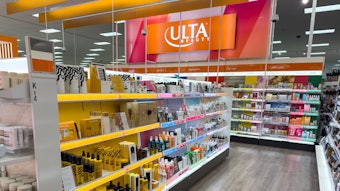Frank Penna, President, San-Mar Laboratories
Frank Penna offers an admirable combination of traits. He is no-nonsense, direct, full of ideas and open to absorbing, embracing and incorporating the knowledge of experts across fields. While guiding a company focused on technologies, and subsequently on the implication for products, Penna is also keenly aware that open, real-time communications and strategic partnerships are critical to the ongoing success of a company.
“Strategic partnerships are a contact sport,” he told GCI magazine. “You’ve got to be strategic in developing technologies and trying to get them into the marketplace. It’s a very intimate relationship. Technology is always time-consuming, and it takes discipline.”
Expanding the scope of partnerships, San-Mar established S.M.A.R.T. (San-Mar’s Advanced Research and Technologies) to provide its clients with licensed technologies from major universities and biotech companies. The list of S.M.A.R.T. advisors includes scientists and professors from Yale, Boston University and The New York Botanical Gardens—as well as marketing professionals, chemists and medical professionals.
Katharine L’Heureux, Founder, Giving Beauty and its Kahina brand
In the fall of 2007, an excursion through Morocco took Katharine L’Heureux from Rabat to Casablanca to Marrakesh, and subsequently deeper into the south of the country, where the argan forests cover some 1.5 million acres. It was there, in the midst of government cooperatives and a rather wobbly economic infrastructure, that she came upon the idea of an organic, argan oil-based skin care line. The argan forests are a national preserve, preventing foreign bodies from exploiting this rich resource. Cooperatives were established in villages across the south to harvest and process argan oil. By Moroccan law, only Berber women of the south are allowed to harvest argan. Once L’Heureux learned about these cooperatives, witnessed their function and importance, it was “the a-ha moment.” She was able to establish a direct relationship with the cooperatives, resulting in Kahina—a brand line of 100% organic argan oil products, consisting of a facial system, as well as pure argan oil, said to neutralize free radicals and protect skin against all manner of environmental stressors.
Since, Giving Beauty has established literacy programs within the cooperatives to teach the women there, nearly all of whom are functionally illiterate, how to write their names, how to recognize the letters of and communicate in Arabic—along with other practical skills such as using cell phones (the preponderance of which, even in such remote areas, should in this age surprise no one) and bus schedules, for shopping and travel. “I did not want to do another token gesture for marketing purposes,” says L’Heureux. “I really wanted this to be meaningful. [These women] all value education so much because they value it so much for their kids.” The aim of these literacy sessions is to empower the women ultimately responsible for Kahina, and to also enrich their communities, which Giving Beauty also does by returning 25% of the brand’s proceeds directly to the cooperatives. “It’s the new economy,” L’Heureux says, “You can do good and it will, in turn, come back to you.”
Eastman Chemical Company
In June 2009, Eastman Chemical Company was recognized by the U.S. Environmental Protection Agency and awarded a Presidential Green Chemistry Challenge Award for the development of a green biocatalytic process that uses enzymes and closely controlled conditions to make esters, eliminating the high temperature and strong acids traditionally required in their manufacture. Esters are a vital building block in thousands of products. The cosmetic and personal care industry in North America annually consumes an estimated 50,000 metric tons of esters for a variety of uses including emollients, emulsifiers and specialty performance ingredients. The company’s process consumes less energy while making high quality products, even when beginning with sensitive starting materials.
At the Washington, D.C. award ceremony, Thomas Lane, president of the American Chemical Society, noted that Eastman achieved its green goals because of the company’s and its chemists’ ability to understand and anticipate the consequences of their work. It is clear that these efforts of Eastman and its chemists make a difference in a scope broader than the beauty industry alone, and work such as this offers a positive outcome beyond the products themselves.
Corey Huggins, Brand Manager, Black Opal
The recent rebrand and expansion of Black Opal cosmetics was the result of more than two years of strategic planning by Corey Huggins, coordinated to coincide with the brand’s 15th year on the market. “I’m all about strategic planning,” he says. “When I came on board, I knew where Black Opal was, and consequently I knew where I wanted to take it.” Having come to the beauty industry on a roundabout path—Harvard, followed by a brief, unhappy stint at a New York law firm, thereafter earning a marketing MBA from New York University—Huggins is adamant about what it takes to succeed: “It’s one thing to have a dream; it’s another to figure out how to achieve that dream.”
The nucleus for Black Opal’s rebranding plan was born of a shift in the cultural weather. The brand launched in 1994 during what Huggins describes as the “Second Black Renaissance,” which saw black disposable income at an unprecedented level for the first time … as well as record black enrollment in colleges and universities. Black Opal filled a very definite need in the African-American community for a skin care brand that was aspirational, trustworthy and of definitive quality. In the new “Obama Era,” the focus has shifted away from the perception of a black skin care regimen as a mode of cultural identity toward a more multicultural and thus inclusive branding perception, a trend astutely anticipated and exploited by Black Opal.
A new logo, a new tagline (“Become Your Beauty”) and new product lines—including bronzing powders and concealers, as well as real photography shade strips on-shelf—saw the rebrand successfully connect with regular women and men in a manner based less on flash than on authority and aspiration. Increased sales and market presence followed almost immediately. The brand’s renewed purpose is to make “the [regular] you into the very best you that you are capable of being,” says Huggins. “We don’t just create beauty products; we create beauty dreams. It’s not about me, it’s about Black Opal. My time here has been all about achieving the Black Opal dream.”
David Pollock, CEO, American Private Label
Exploring technologies, product development, operations management and marketing to home shoppers—it seems pretty safe to say there are very few beauty industry professionals with experience and expertise in such diverse aspects of the industry. Yet, David Pollock has been able to leverage this unique résumé to guide a technology-driven company that also has the expertise to provide packaging design and marketing support toward the success of private label brands. The team under his guidance develops, formulates, manufactures, markets and distributes product concepts and pre-designed product ranges based on green chemistry. Pollock seeks to change the private label industry by helping retailers use the recession to their advantage.
Among his product development achievements, Pollock is responsible for several early alpha hydroxy acid products, the first mass-market vitamin C line and an acne system that topped sales in mass-market for 18 months. His experience in formulating is augmented by his product marketing and operations background—including as the CEO of Hydron Technologies, a publicly traded skin care and pharmaceutical technology licensing, contract manufacturing and branded skin care sales through QVC and HSN; founder of Clinical Results, Inc., a contract product development laboratory; vice president of product development for the Home Shopping Network; executive vice president of Medi-Cell Laboratories; and as part of Fuller Brush Company’s senior management team, overseeing a 500,000-square-foot manufacturing operation.
Pollock is also an active member of the Society of Cosmetic Chemists, has written articles for various consumer and trade publications, was a contributing writer for a textbook on delivery systems for chemists and recently announced his first consumer-oriented book on the secrets of the beauty industry and the path to unlocking one’s inner beauty.
Esi Eggleston Bracey, Vice President of Global Cosmetics, P&G Beauty & Grooming
Esi Eggleston Bracey was the recipient of Cosmetic Executive Women’s (CEW) 2009 Achiever’s Award for outstanding contribution to the beauty industry in her role as harbinger of systemic growth and evolution for P&G beauty up-market strategy in the face of an almost impossibly constricting financial downturn. One of the youngest general manager appointees in her company’s history, and the very first female African-American to attain such a position, Bracey oversees an operation that achieves more than $2 billion in retail sales, and is the light-keeper of P&G’s Covergirl and Max Factor brands globally. The former brand has, thanks in large part to its Lash Blast mascara, been staging a singularly effective grab at the eye makeup segment, a business long dominated by L’Oréal’s Maybelline brand. Two of Bracey’s greatest branding triumphs, heralding a new era of brand identity and cross-demographic marketing strategy, were the emergence of award-winning singer and actress Queen Latifah as a national Covergirl, following shortly on the heels of comedian Ellen DeGeneres’ appointment to the same—two very popular, talented and strong women with broad appeal who also represent specific social segments still considered to be in the minority. With DeGeneres as spokeswoman, Covergirl and Olay’s Simply Ageless Foundation became the biggest- and fastest-selling foundation at mass retailers during its first full quarter on market, and sales have only continued to progress. P&G’s future holds further market strengthening and expansion into developing markets, with Bracey leading the fold. Her leadership successfully spurred new product growth after the Olay cosmetics plug was pulled, and that same leadership will see P&G into the near future, and makes Bracey someone “to know.”
Rochelle Bloom, President, The Fragrance Foundation
In a time when fine fragrance is taking its knocks at the sales counters, the industry can take some solace in having an advocate in Rochelle Bloom, who looks unflinchingly at the reality and where there has been a shortfall while still offering reassurance and an action plan toward an upward slope of success.
“We have become complacent, taking the easy path, and transformed what was a highly prestigious category and made it into a commodity,” she has said. “In doing so, the perception of fragrance is extremely different today than it was 20 years ago.”
Bloom began her career in beauty with The Estée Lauder Companies in 1976. Her career has spanned the company’s premier brands in both domestic and international markets. After a two-year stint in Canada, Bloom returned to the U.S. as director of advertising and sales promotion for Clinique International before rejoining the Estée Lauder International brand as field marketing director for Latin America, Asia and select European markets. In 1979, she launched Prescriptives International as vice president/general manager. In 1986, she was promoted to senior vice president/general manager of Estée Lauder International, a position in which she tripled sales and quadrupled profit. Bloom assumed the presidency of The Fragrance Foundation, a global organization whose primary focus is to build awareness and promote the use of fragrance around the world, in 2003.
And the brand manager in Bloom clearly coexists with the industry advocate.
“It’s no longer business as usual, and the industry needs to regroup and make some significant changes to send the signal that it understands the needs and wants of the customer and then deliver,” she wrote for GCI magazine. “The industry needs to go back to its roots, when it built brands and took risks and made fragrance a must-have in everyone’s daily life. Those who recognize and act on this crucial sea change will survive. Those who continue to do business as usual will not. I’m betting on the former. This is an industry that has more creative and marketing talent than any other. Now is the time to harness this talent and make magic again.”
In addition to her responsibilities through The Fragrance Foundation, Bloom serves as an advisory board member of the Fashion Institute of Technology (FIT) master’s degree program, The Fashion Institute of Design & Merchandising, and the Manhattan Theater Club. She also teaches master’s level management at FIT.
Joni Rae Russell, Principal and President, Joni Rae and Associates
Through her role as principal and president of Joni Rae and Associates, a marketing, packaging and creative services firm dedicated to excellence in beauty marketing, Russell has distinguished herself as one of the beauty industry’s foremost marketing, branding and creative authorities. Her commitment to excellence and mastery of industry best practices has yielded award-winning results.
“Joni’s unrivaled marketing savvy is the product of decades of experience at the forefront of beauty industry marketing, branding, product and packaging innovation,” states her “20 to Know” nomination. “Throughout her career, she has time and again combined and exhibited cutting-edge ingenuity, practical and resourceful application, along with unique and imaginative creativity, for some of the industry’s most inspired marketing, branding and packaging initiatives. In fact, Joni’s true gift is her ability to apply left and right brain sensibilities—a rare and valuable attribute in today’s complex business arena. As with most successful visionaries, she truly begins with the end in mind.”
The seeds of Russell’s passion for the beauty industry and acute business acumen, creativity and an ebullient entrepreneurial spirit were sown before college, working alongside her father in the family’s beauty product distribution company. After graduating from the University of Miami with a dual degree in marketing and management, Russell launched her career as director of advertising, sales and education for a full-service beauty distribution company. In 1979, she switched from the client to the agency side when she joined Merchandising Workshop. Five years later, as senior vice president, she set the tone for the agency’s creative group and personally spearheaded new product introductions within 10 divisions of Revlon.
Since 1991, she and her company have successfully launched more than 475 products and redesigned more—developing, directing and executing brand architecture, package development, logo development, sales collateral, POP, displays, advertising, media and public relations.
Karen Khoury, Senior Vice President, The Estée Lauder Companies, Inc.
Throughout the course of her 27-year career in the fragrance industry, Karen Khoury has come to believe that the life of the industry boils down to “the delicate balance of business considerations with passionate creativity.”
Khoury’s tenure in the industry, and the resulting personal and business philosophies she’s developed, is the product of a long line of mentors—from company founder Estée Lauder, who encouraged the development of an “emotional instinct” for fragrance; to Leonard Lauder’s cultivation of Khoury’s focused, multifaceted business engagement; to Evelyn Lauder, who stressed the importance of personal and interpersonal respect. “To appreciate and acknowledge every single individual and contribution to the creative process is more motivating that [one] can imagine,” she said.
Khoury spearheads seven Lauder brands, requiring her to “trade hats,” often several times per day, in order to give each brand its own direct consideration and unique standing. “I’ve adapted several company philosophies into [Lauder’s] fragrance creation process,” she said. “[I] look at our portfolio for strengths, gaps and opportunities. [I] also look at how we measure up to the market as a whole—what’s working and what’s not working. [But] art has [also] always been important to me. The original concept of Pleasures [for example] came from a Georgia O’Keeffe painting.”
Khoury seeks to understand a consumer who is feeling “besieged,” who may, quite understandably given the current economy, have her mind taken up with more prudent concerns—such as mortgage payments, food expenses and career safety. However, Khoury sees this need for mutual understanding as more than a challenge. “[It] is also an opportunity,” she said, “because this consumer needs a break. Every single aspect [of a fragrance] needs to make her feel fantastic and to validate the [purchasing] decision she’s just made.” As an executive, Khoury is careful to never fall out of touch with the trends affecting, or desires and needs of, the average beauty consumer—whether formulating and branding for high-end luxury targets or mass-appeal choices.
Barney Stacher, Strategic Business Development and Management Consultant, Stacher & Stacher ~ Manifest /Co-founder, Green Tea Goods
Manifest—defined as an action that makes clear or evident to the eye and/or understanding. When Barney Stacher, in partnership with his wife, founded their eponymous consultancy, their intent was to make explicit that—while their primary specialty would be business development, strategic planning, and branding and organizational development—their methodology would skew from the run-of-the-mill rhetoric of such servicing.
“In today’s market, as in life,” says Stacher, “having the ability to very quickly recognize, understand and assess challenges and opportunities, and implement timely, innovative and effective solutions is paramount to success. And if you have a sense of humor and can have fun in the process—all the better.” Made “manifest” in both the company’s philosophy and its choice of business relationships was the understanding that Stacher & Stacher was not merely looking for stepping stones toward ever larger fish, but sustainable and rewarding engagement with each and every client, regardless of size or reach.
Targeted partnerships throughout the intervening years—which have included Rogan NY, producer of a “green” clothing line; Blue Q, multiline maker of giftware and bath and beauty products, including the Dirty Girl line; Victoria’s Secret; Bath & Body Works; Target; Playboy, Inc.; and Teany Beverages, an iced tea manufacturer owned in part by Grammy-winning artist Moby—finally culminated in Stacher bringing to market his own product line. Enter Green Tea Goods Natural Hand Refresher and Cleanser, a line of bath and body products utilizing the age-old power of Chinese herbs. Handcrafted with purified spring water, green tea, licorice root and the company’s Special Herbal Blend, the product is aimed at the hand sanitizer market, offering effective use with only 12% alcohol.
Why is Barney Stacher someone “to know?” Perhaps his rational for choosing his job title offers the best example of his perpetual forward-thinking approach to both today and tomorrow. Eschewing the common president and CEO, Stacher instead went with Director of How and Why, explaining that, “I believe everyone should be able to answer the questions, ‘How?’ and ‘Why?’ [Secondly,] it also provokes the questions, ‘What does that mean? What do you do?’—which allows me the opportunity to engage in a unique and thought-provoking conversation with anyone I meet.”
Herb Ravitz, Founder, Universal Preserv-a-chem Inc.
There are few among us who can reflect on the changes that have occurred during more than 50 years in the personal care industry. Of that number, fewer still are active participants in today’s complex business environment. Herb Ravitz has seen it all and then some. Ravitz is the founder of Universal Preserv-a-chem Inc. (UPI), a New Jersey-based distributor of additives and ingredients for hair care and skin care.
“In my time, the globalization of the industry through the use of the Internet has been stunning, opening up markets and fueling Universal’s development,” says Ravitz. “Our customer base regularly demands new and innovative technologies. I’ve witnessed a transition into more natural and green product offerings that require levels of technical specialization never imagined years ago.”
In reflecting on the past, Ravitz still looks ahead: “I’m proud of UPI’s growth through difficult economic cycles and transitions in the chemical and personal care industries. I believe in the future of small, highly focused chemical companies. Moving forward, even more will be expected of suppliers to keep up with consumer requirements.”
Sam Dhatt, President and CEO, DermaQuest
Twenty dollars, 20 years and more than a little drive—Sam Dhatt is the kind of success story worth noting in any walk of life. After earning an master’s degree in chemistry and an MBA in marketing and finance in his native India, Dhatt moved his growing family to the U.S. with $20 in his pocket. Shortly after the relocation, he obtained an entry-level position as a cosmetic formulator and became the lead chemist within a few years. He began to then make his mark uncovering and developing new technologies in his work with alpha hydroxy acids in 1992, which, he says, was in its infancy at the time.
By 1995, Dhatt had started his own cosmetics research and development company, Allure Cosmetics, Inc., concentrating on antiaging products. After formulating and manufacturing more than 700 skin care products, Dhatt had decided it was time to create a line that leveraged the product insights he had gained—creating DermaQuest in 1999 and committing to advancing the practical science of skin care.
Ada Polla, Co-creator, President and CEO, Alchimie Forever
Ada Polla—the Swiss-born president and CEO of Alchimie Forever, a global cosmeceutical skin care brand—has called Estée Lauder one of her business role models, noting that Lauder involved herself in all aspects of the business (including selling creams to women in department stores). “She was a huge believer in putting herself out there, and she never worried if she had gotten in over her head.”
Since launching her brand as a 17-SKU line, she has been the driving force behind the business’s development and expansion—establishing international distribution and driving the company’s double-digit annual revenue growth—and is doing a fair impression of Lauder by “putting herself out there.”
In addition to growing the brand designed to be at the “intersection of science and nature”—dermatologist-formulated products with active ingredients derived from vegetation—Polla strives to remain the lynchpin between the brand and its customers, filtering and answering, for example, all consumer generated e-mail. “I feel so strongly in being involved with our clients and consumers,” the Harvard and Georgetown grad told GCI magazine. “I think in today’s impersonal world, consumers are looking for that personal connection. In particular, as we are a family business, this personal connection is at the core of our values and brand personality.”
The “family” in family business has been critical in both the development of the business and in how it approaches consumer needs. Polla told GCI magazine that one of the milestones she was most proud of achieving was building a team, and cites her parents’ influence for her personal business acumen.
“My father really instilled a sense of hard work and passion in me. He loves to help others feel good, and I think that is one of the rewards for our business. He has also taught me about vision and creative force—thinking outside the box, not doing things the way everyone has always done them. My mother has taught me that in reality there is no such thing as work-life balance; work is life and life is work when you own your business.”
Featured on the cover of Business Week Small Biz and recently named one of five finalists for the Entrepreneur of 2009 contest presented by The UPS Store, Polla is also the founder of the Network of Entrepreneurial Women, an association for women entrepreneurs in the Mid-Atlantic region; is on the boards of the Washington D.C. Chapter of the Fashion Group International and of the Washington D.C. Coalition for Capital; and is a committee member of the International Spa Association.
Karen Young, CEO, The Young Group
Experience, a deep knowledge of trends and an interesting, complementary and on-target combination of interests is the recipe for a true asset to an industry. Karen Young is that combination, and—like icing on the cake—she is an insightful, engaging and timely speaker.
Before opening The Young Group in 1999, Young was vice president of marketing, advertising, product development and sales promotion for Lancôme. Before that, she spent 17 years at Estée Lauder, where she held a variety of executive positions, including executive director of color cosmetics. Since opening The Young Group, Karen has worked extensively in all categories of the beauty industry. She has developed concepts and products for RoC, Bath & Body Works, Neutrogena, Crabtree & Evelyn, Vichy, 3M Products and Canyon Ranch. Young has also worked with numerous established brands—including Christian Dior Beauté, Shiseido, Parfums Givenchy, Coppertone and Avon.
As a certified personal trainer and nutritionist, Young has noted that she is drawn to projects that combine beauty, health and wellness—and projects such as these are right in step with where, it is clear, much of the beauty industry is going.
Young is also an adjunct professor at The Fashion Institute of Technology, teaching product development in the master’s degree program in cosmetic and fragrance marketing and management, and partnered to form Leading Edge Innovations LLC—a strategic alliance with several technology centers to bring a think-tank approach to personal care formula and delivery system innovation toward the goal of creating truly differentiated products.
Kim Bleimann, Chairman and CEO, Berjé Inc.
Kim Bleimann embarked on his career in the flavor and fragrance industry and Berjé, Inc. in 1973. The fragrance compounder assumed the presidency of the company in 1981, and under his guidance, Berjé has grown from a company of nine employees to a firm with offices in Los Angeles, Cincinnati, Atlanta, and Plovdiv, Bulgaria—where Berjé became the first American company to produce rose and lavender in Bulgaria. Berjé has been an active global supplier of essential oils and aromatic chemicals, and recently made acquisitions to grow in additional markets.
To anyone who has heard or read his presentations at Women in Flavor & Fragrance Commerce events, it is also clear that Bleimann is a thinker beyond dollars, cents and essential oils—instead considering the industry in terms of global influence and pondering the impact on the richness of human experience.
In addition to wider industry involvement, Bleimann serves as the treasurer for the International Federation of Essential Oils and Aroma Trades; on the board of The Orpheus Chamber Orchestra, a conductor less chamber orchestras whose leadership management style has served as a business model for organizations such as Morgan Stanley; and has been elected to the Muhlenberg College Board of Observers, which serves as an independent evaluator of the school’s performance. Bleimann is also a published author on the subject of essential oils.
Jill Belasco, Founder, President and CEO, Maesa Home, a division of the Maesa Creative Beauty Group
A proven brand-builder with the business acumen to make a positive impact along the entire supply chain and onto the shelf, Jill Belasco has held national management positions for some of the world’s leading fragrance companies and retail chains—including Halston–Orlane, Charles of the Ritz, May Department Stores and Colonia-Muehlens 4711— directing product introductions and marketing campaigns throughout the U.S.
and Europe. In 1994, she left her position as vice president of sales for Crystal Brands Jewelry to form Latitudes International, a designer and manufacturer of fragrance products. Here, she developed and maintained strong relationships with buyers for large retail chains and brand manufacturers—including Pier 1, Bath & Body Works, Pottery Barn, The Body Shop, Estée Lauder, Williams Sonoma, Old Navy, Crabtree & Evelyn, Trish McEvoy, Starwood Hotels and Frederick’s of Hollywood. In December of 2007, the Maesa Group, a publicly traded company based in Paris, acquired Latitudes.
She has earned notice as Outstanding Business Woman of the Year for Retailers in Los Angeles and Entrepreneur Magazine’s 2005 Woman of the Year award, and as a finalist for the Los Angeles Business Journal’s “Women Who Make a Difference” award. In 2007, Beauty Industry West honored her as “Entrepreneur of the Year,” and, under her leadership, Maesa Home has been awarded the FiFi award for excellence multiple times. Additionally, Belasco founded a business consulting firm specializing in women’s apparel, and is a partner in Rochester, Roanoke and Associates, a real estate firm in Los Angeles. She is an active member of the National Association of Women Business Owners, and sits on the boards of Cosmetic Executive Women, The Fragrance Foundation and the Fashion Institute of Design and Merchandising in Los Angeles. She is currently board chair of Youth Mentoring Connection, a nonprofit organization aiding at-risk teens in the Los Angeles area, and is involved in a variety of environmental and political organizations.
Prakash Purohit, President and Founder, Naturich Labs Pvt. Ltd.
As the founder of Naturich Labs Pvt. Ltd., Prakash Purohit brings more than 27 years of experience to the creation of organic and naturally derived personal care products and fragrances. At Aveda, he spent more than 17 years as senior vice president of R&D, where he worked on the creation of more than 400 products.
Leveraging experience in quality control, microbiology, safety testing and claims substantiations—as well as expertise in aromatherapy, ayurvedic principles and organics—the graduate of Harvard Business School’s Advanced Management Program has worked to build a company that focuses on naturally derived ingredients that offer premium functionality.
Among his accomplishments, Purohit holds three patents, including one for a preservative made from essential oils; spearheaded the creation of an organic standard guideline for personal care products; and was among the pioneers in natural formulas for the salon and masstige markets.
R&D Group, YG Laboratories
YG Laboratories has been researching cell-targeted technologies for several years, and recently began producing some of these technologies for beauty brands. The company’s R&D group began its research with a simple concept in mind: Since skin cells are the microfactories of the skin, new technologies will focus on the biochemistry underlying the health, activity and productivity of these cells along with the quality of the tissue they produce. While many companies focus on the skin itself, they are working downstream of damaged cells, not upstream in the cell itself where skin tissue originates. YG Labs is working to develop holistic approaches that target organelles and cellular biochemistry—including broad-spectrum repair of nuclear DNA and mitochondrial DNA, as well as protection from damage. In addition, it identified all seven sirtuins in nuclear and mitochondrial DNA, an area that has not yet been addressed to any great degree in commercial skin care. Sirtuins are enzymes found in virtually all organisms, allowing cells to survive damage and delay cell death.
Further, YG Labs’ scientists are considering the effect of epigenetic expression on skin cells, changes in gene expression not triggered by underlying DNA sequences. Recent research indicates changes in gene expression can occur via lifestyle choices such as exposure to tobacco smoke, alcohol consumption, stress or relaxation responses. These changes can occur within minutes and, depending on how the epigenome is cycled within the cell, can be passed from one generation to the next. Among other issues, the epigenome may explain a proclivity to good skin passed from one generation to another, so YG Labs is looking into epigenetic influences in skin development with the long-term goal of developing ingredient technologies to address these influences.
The R&D group is also researching gene array protocols as an extra layer of analysis and testing to compare genes in youthful skin, mature skin and skin treated with certain combinations of DNA-targeted ingredients. While explaining the results of these tests to consumers can be a challenge for a company’s marketing department, the company is developing explanations and terminology compliant with FDA and FTC regulations.
Artistry’s Marketing Team, Amway Global
In 2009, Amway Corporation’s Artistry brand was in its seventh year as one of the top five worldwide beauty brands, posting $1 billion in global sales. Artistry’s success is particularly unique given Amway’s long-standing distribution/sales network, and Artistry’s marketing approach is evolving to maintain the level of success and grow the brand. To maintain the company mission of truth in science, consumer relationships and beauty, Artistry has relied on the marketing campaign “True Science, True Beauty” for several years. The worldwide campaign affords the company the opportunity to highlight the science behind the products.
Artistry created a global team to address specific challenges of effectively marketing to a global audience—with members assigned to different global regions with responsibilities for bringing current market insights to the table. The drive to address the expanding market and elevate the brand’s profile led to the addition of two “micro-sites” to www.artistry.com. One, www.artistrybeauty.com, offers information on the company’s mobile brand experience, while www.youngerlookingskin.com is specific to antiaging products. All these efforts are geared toward understanding how the marketing message must be expressed through every aspect while bringing that message to consumers in new ways.
Len Kulka, Director, Creative Development, ColorWorks, Consumer Packaging, Clariant Masterbatches
With a blend of eloquence and expertise, Len Kulka helps brand owners apply the latest color innovations and technologies to packaging that emphasizes branding, shelf presence and market differentiation.
Kulka—who joined Clariant Masterbatches in 1996 after nearly 25 years in the plastics colorants industry—has held a variety of engineering, technical and development positions and has experience in a wide array of plastics molding processes, with an emphasis on the use of special-effect colors in multi-layer polyolefin bottles. With the insight on colors and technical prowess in every stage of bottle manufacture, forged by his background, speaking with Kulka illuminates a world of possibilities. It is this background that allows what is imagined to become that which is realizable.
“Where I think we distinguish ourselves is in our understanding of what’s out there in the marketplace, what’s available on the technical side, what the brand owner is trying to achieve,” he told GCI magazine in late 2009.
Among his accomplishments, Kulka introduced the first commercial color system for personal care HDPE tri-layer bottles, and was responsible for the first commercial launch of soft touch, iridescent, foam etching and Spectrachrome effects in HDPE multi-layer bottle structures. His most recent efforts have been focused on the development of color systems for the newest color gradation special effects. In addition, he is a member of the Color Marketing Group and the Society of Plastic Engineers.










